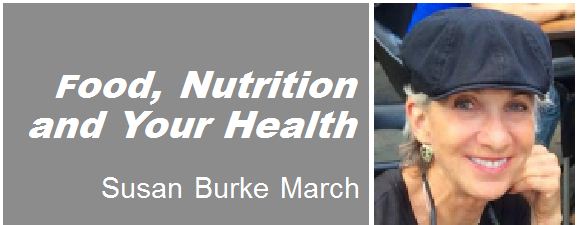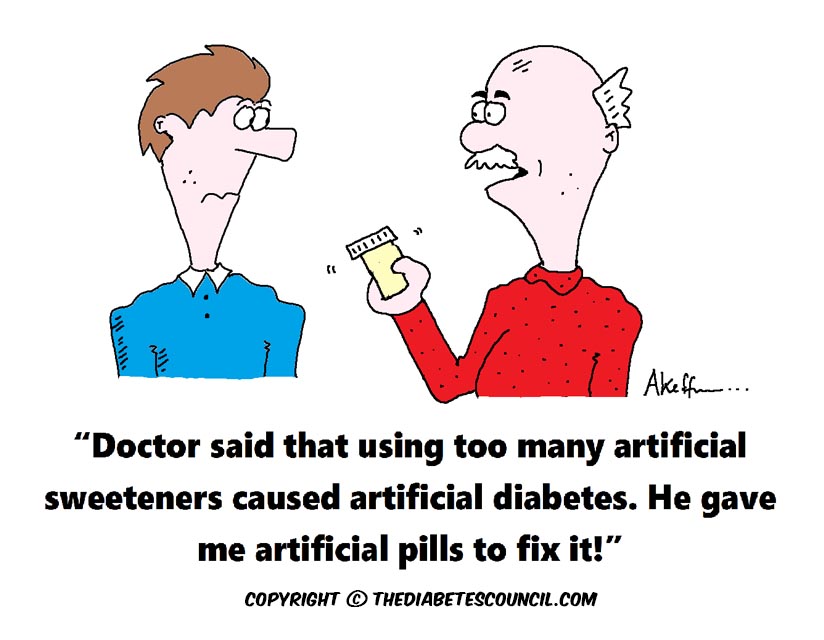Don’t let the facts ruin a good story: Artificial sweeteners and weight loss
Reporting on nutritional news is fraught with misinterpretation. One recent example was coffee. Headlines pronounced that drinking coffee prevents heart disease and stroke.
Happily for those who dislike coffee, the study never suggested that people who don’t drink coffee are at higher risk. There could be some significant lifestyle factors that strengthen the association between drinking coffee and good health. I covered this in my August 3 column.
who don’t drink coffee are at higher risk. There could be some significant lifestyle factors that strengthen the association between drinking coffee and good health. I covered this in my August 3 column.
There’s also plenty of confusion when it comes to making connections between artificial sweeteners and weight loss.
Most of the data collected for diet studies are observational or relies on participants self-reporting. Studies show that people consistently under-report how much they eat and over-report how much exercise they do. Even those who are coached to be honest ‘cause they’re participating in scientific studies still fudge the truth!

So when the results of a recent study on artificial sweeteners hit the headlines, I knew some reporting would be distorted. And it was. ScienceDaily.com wrote, “Artificial sweeteners linked to risk of weight gain.” Time.com reported, “Artificial sweeteners are linked to weight gain—not weight loss.”
My colleague Ted Kyle, founder of ConscienHealth.org, an advocacy group for evidence-based prevention and treatment of obesity, nicely illustrated this media madness in a recent column.
He noted that in 2012, then television personality Donald J. Trump tweeted, “I have never seen a thin person drinking Diet Coke.”
Ted weighed in, “No kidding. This insight comes straight from Statistics for Dummies.”
“Associations are a starting point for sorting out a question – not the end point. People who take aspirin often have headaches. But that’s because aspirin relieves headaches, not because it causes them.”
To summarize the sweetener study: it was a “systematic review and meta-analysis on low-calorie sweeteners and their association with cardiometabolic effects and body mass index (BMI).”
Researchers examined 7 randomized controlled trials (RCTs, the gold standard of research) and 30 observational studies in adults and adolescents, with a median study follow-up of 10 years.
RCTS are very accurate but very expensive to do, and that’s why the follow-up for the RCTs averaged only 6 months. Results showed a neutral effect: low-calorie sweeteners (LCS) did not cause weight loss or weight gain.
The observational studies, not known for their reliability, followed people out over 10 years and were associated with weight gain and higher risk for type 2 diabetes and heart disease.
Does this mean that consuming foods sweetened with low or no-calorie sweeteners cause weight gain? Absolutely not.
Ted wisely wrote, “People use artificial sweeteners because they hope it will help them consume fewer calories and lose or keep from gaining weight. Most (but not all) people who worry about their weight are carrying some extra pounds. To answer the question of causation, it’s best to do a real experiment. And the randomized, controlled trials of low-calorie sweeteners have shown either a modest benefit or no benefit. In other words, they offer no miracles and they cause no harm.”

Artificial Sweeteners Safety
Registered Dietitian Kris Sollid, of the International Food Information Council Foundation wrote about low calorie sweeteners, noting, “The 2015 Dietary Guidelines Advisory Committee recently assessed the relationship between LCS and measures of body weight and obesity and found consistent evidence that when replacing sugar-containing sweeteners, LCS usage reduces calorie intake, body weight, and adiposity. The DGAC graded available evidence from RCTs stronger than prospective cohort studies.”
Sollid advises, “Regardless of the media headlines you read, LCS shouldn’t be viewed as a magic bullet nor as a detriment to health. They are neither. Instead, they should be viewed as one of many safe options that can be included in your broader weight reduction or maintenance strategies.” Read the report here.
Sugar, Sugar, Sugar, Sugar, Sugar
But, excess sugar consumption is a problem, throughout the world, and it appears that economically disadvantaged people are bearing the brunt of the sugar saturation.
appears that economically disadvantaged people are bearing the brunt of the sugar saturation.
For example, as demonstrated in a recent 2016 paper published in Journal PLOS One, Ecuadorian households from the poorest quintile show three times the excess sugar consumption that households in the top quintile show.
Latin America’s obesity epidemic affects every single country on the continent, and the American Journal of Managed Care reports, “Mexico is the perfect example of how Coke and Pepsi are investing heavily in the next generation of soda drinkers, and the country has the highest rates of obesity in the world.”
In the USA, almost two-thirds of adults and a third of kids are overweight or obese. Drinking sugary beverages is associated with an increase in calorie intake (beyond the levels contributed by the beverages), an increase in body weight, type 2 diabetes, dental cavities, and many more chronic diseases.
But, does drinking sugar-sweetened beverages cause obesity? For an individual, it depends on how much you drink, and the quality of your overall diet. Certainly, it’s more likely to impact your health and your teeth if you drink them consistently.
The Marketing Of Sugar — Bottled Beverages, Sodas, “Energy Drinks”
Sugary beverage manufacturers are on the hook, in my book. They constantly market high-calorie beverages as if they’re a solution for low energy. They spend billions of dollars each year on marketing directly aimed at youth, messaging soft drinks as “fun.” They add some vitamins to the brew and call them “nutritious.”
Get a 12-oz. can (355 ml) of regular Coke. Now, fill a 12-oz. glass with agua con gas. Spoon 9 teaspoons of white sugar into the glass of and stir. Try it with a 20-oz. (590 ml or 2 ½ cups) of Coke — it contains more than 16 teaspoons or sugar.

Most people aren’t aware that a soda contains that much sugar. A soda is just that, sugared water, plus caffeine, food coloring, tooth-destroying phosphorus, and artificial flavors.
SugarStacks.com dramatically displays the amount of sugar (displayed in sugar cubes) in various sodas. Click here to view.
So-called ‘energy drinks’ are marketed chiefly to adolescents, teens, and young adults — products like Rock Star and Monster Energy. Ecuador’s own 220v Energy Drink is one of the worst — and since it’s manufactured locally, it’s really cheap.
You’ll be disgusted if you visit their website and read the claims about the “benefits” of this sugar-laden beverage. They claim that “pure water from Tesalia Springs” combined with added caffeine, taurine, and B-vitamins will “improve the performance in work, studies, home, etc.”
Oh, please. Another word for “energy” is calories, and “empty calories” describes foods that are high in energy but devoid of nutritional value.
And as often as you might be told differently, you’re not drinking “life” or “fun” or “energy.”
 How To Be a Label Sleuth!
How To Be a Label Sleuth!
Let’s examine the Nutrition Facts for a 20 oz. (600 ml) bottle of 220V Bebida Energizante:
The problem is, unlike Coca-Cola, the makers of 220v do not share the nutrition facts on their website. But, I’m a real sleuth, and have lots of empty containers of all sizes, gathered on my morning walks on the Tomebamba. I use them to teach classes in label reading, but I warn you! Get out your magnifying glass if you want to try this at home — the print is extremely pequeño!
I’ll tell you the punch line first:
The Nutrition Facts label displays everything — the calories, grams of sugar — in ONE serving, which is listed as 100 ml.
But the bottle contains 600 ml!
No one drinks one-sixth of the bottle…they drink the entire bottle, right?
So multiply all nutrition facts by 6.
Calories per serving: 50. That doesn’t sound too bad.
But, multiply 50 calories by 6 servings. That’s 300 calories
This is where it’s so important to be a sleuth. One teaspoon of sugar = 4 grams.
How much sugar?
Listed: 13 g (3.25 teaspoons) of sugar per serving.
Not too bad, you might think? Think again.
Multiplied by six, this bottle contains 78 g of sugar or 19.5 teaspoons of added sugar in this bottle.
Sickeningly sweet, isn’t it?
Health experts recommend no more than 6-9 teaspoons (100-150 calories) from added sugars for the entire day. The average American consumes more than 22 teaspoons, or about 355 calories daily.
Read the Ingredients First
Even if you don’t read the numbers, read the ingredients and decide if you want to imbibe.
Ingredientes: agua carbónica, entonces azúcar, entonces dextrosa
Ingredients on a food label are listed in descending order of volume or weight, so that translates to fizzy water, then sugar, then more sugar.
Additional ingredients: citric acid, then a mix of vitamins, some artificial flavors, and other preservatives, and of course, caffeine and caramel color.
Best Beverages on Earth!
Some studies suggest that artificial sweeteners could confuse the taste receptors and monkey with metabolic response, but they’re not conclusive. Science is continually evolving, and since ‘artificial’ is, after all, artificial, you may want to avoid artificial sweeteners altogether.
I’ve recently written about stevia, and whether it’s a healthier ‘natural’ alternative: click here to read. Since packaged and refined stevia is 300-400 times sweeter than sugar I’m betting that in this form it would be included in how scientists suspect sweeteners influence taste receptors.
By the way, bottled sodas, whether diet or regular, typically contain phosphoric acid, an acidifying agent to enhance taste — consumption in beverages is linked to osteoporosis and is corrosive to teeth.
Enjoy the best beverages on earth — Cuenca water is rated tops, or try some bottled sparkling water, and brighten up the taste naturally with a splash of fresh citrus.
Don’t forget that coffee and black and green teas (and herbal teas) are healthful, containing polyphenols and antioxidants.
And maybe a little wine for thy health? Maybe! Stay tuned for some alcoholic beverage myth busting, pronto.
Sources
CMAJ. Research. Nonnutritive sweeteners and cardiometabolic health: a systematic review and meta-analysis of randomized controlled trials and prospective cohort studies. http://www.cmaj.ca/content/189/28/E929.full
ConscienHealth.org. It’s OK to Hate Sweeteners, Just Don’t Wrap It in Science. http://conscienhealth.org/2017/07/ok-hate-sweeteners-just-dont-wrap-science/
European Food Safety Authority. Aspartame. http://www.efsa.europa.eu/en/topics/topic/aspartame
Journal of the American Geriatrics Society. Statin use and 25-hydroxyvitamin D blood level response to vitamin D treatment of older adults. http://onlinelibrary.wiley.com/doi/10.1111/jgs.14784/abstract
Mayoclinic.org. Artificial sweeteners and other sugar substitutes.
Office of Disease Prevention and Health Promotion. Scientific Report of the 2015 Dietary Guidelines Advisory Committee. What is the relationship between intake of low-calorie sweeteners (LCS) and measures of body weight/obesity? https://health.gov/dietaryguidelines/2015-scientific-report/14-appendix-E2/e2-47.asp
PlosOne. The Effect of Price and Socio-Economic Level on the Consumption of Sugar-Sweetened Beverages (SSB): The Case of Ecuador. http://journals.plos.org/plosone/article?id=10.1371/journal.pone.0152260
SugarStacks.com. Beverages. http://www.sugarstacks.com/beverages.htm




















